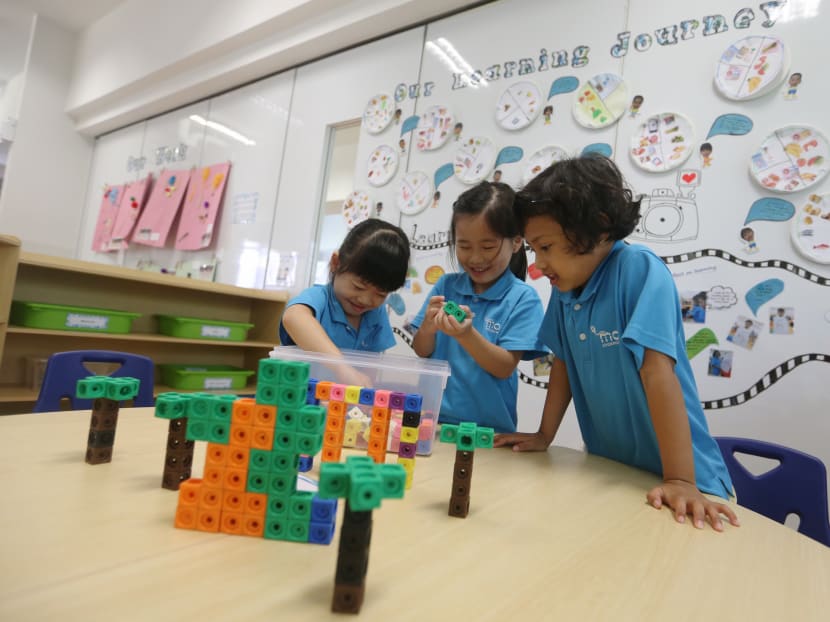40,000 additional places, 35 more MOE kindergartens in next 5 years
SINGAPORE — Having made “good progress”, the Government is set to raise its level of involvement in the pre-school sector and further ramp up the number of pre-school places, including more spots for infants up to four years old.

Prime Minister Lee Hsien Loong said 40,000 pre-school spots will be added by 2022, bringing the total number to about 200,000. Photo: Koh Mui Fong/TODAY
SINGAPORE — Having made “good progress”, the Government is set to raise its level of involvement in the pre-school sector and further ramp up the number of pre-school places, including more spots for infants up to four years old.
Among other initiatives, it will increase the number of Ministry of Education (MOE) kindergartens significantly — from 15 to 50 in the next five years — and set up a new national training institute for early childhood educators to bolster the quality of teaching.
Announcing the moves at the National Day Rally, Prime Minister Lee Hsien Loong said 40,000 pre-school spots will be added by 2022, bringing the total number to about 200,000. “(This) will almost be doubled what we had,” Mr Lee noted.
The Early Childhood Development Agency (ECDA) said these full-day pre-schools will have capacity for 200 children each, which is twice the size of an average centre today. Anchor operators will run the bulk of these new centres.
Over the last five years, almost 50,000 childcare and kindergarten places were added, especially in young estates such as Punggol and Sengkang. However, Mr Lee noted that there is still a shortage of pre-school places for infants up to four years old. To address this, the People’s Action Party Community Foundation (PCF) will create more places and build Early Years Centres for this group. These centres will be located in new Housing and Development Board estates, and will partner nearby MOE kindergartens.
A child who enrols in an Early Years Centre will have a place reserved in the MOE kindergarten when he or she is five to six years old, if the parents choose to take it up.
Identifying the need to build up the pre-school sector as one of the important longer-term issues for Singapore, Mr Lee said the Government has more than doubled its annual spending on pre-schools from S$360 million in 2012 to S$840 million this year.
The figure will double again in the next five years to S$1.7 billion. “It’s a heavy investment but worthwhile,” said Mr Lee.
Meanwhile, the quality of pre-school education for those aged five to six years old will also be improved. While there are enough places for this group, the Government wants to raise the standards further, said Mr Lee.
MOE will lead the way by scaling up its kindergartens. This will enable the ministry to “make a bigger impact beyond its own MOE kindergartens” by influencing and raising the quality of the whole sector, Mr Lee added.
MOE kindergartens were started in 2014, a year after the Government set up the ECDA. “Five years ago, the Government moved decisively, to build up pre-schools and transform the whole sector,” Mr Lee said.
The ECDA also said it has appointed an additional 29 centres to the partner operators scheme since Aug 1, bringing the total to about 200. Such centres give parents a one-off fee reduction. When these measures come on stream, two out of three pre-schoolers, up from the current one in two, will have a place in a Government or Government-supported pre-school, the ECDA added.
Going forward, the Government will also upgrade the pre-school profession to attract good teachers and carers.
For example, a new National Institute of Early Childhood Development will be set up soon to train teachers and carers, by bringing together existing programmes at various institutions.
To attract more to the early childhood sector, the ECDA will start a three-year national campaign to raise public awareness of the importance of providing children with quality education early. The agency estimates that the early childhood sector will need 20,000 professionals by 2020, up from around 16,000 now.
Mr Lee reiterated the importance of pre-school in helping parents to ensure their children “(are) given a good start (and) the best chance to succeed in life”. He noted that the aim was not to give children a head-start on Primary 1, “but to build (sound) foundations for them for life”.
Mr Lee noted that there are “specific windows in a child’s development”. For example, a child picks up language skills “most easily and rapidly” in his first three years. “You miss that, and it becomes much harder later on,” he added. Social and emotional skills need to be learnt early too, he said.
In his Mandarin speech, Mr Lee said the Government has “decided to strengthen our bilingual education from pre-school”. Without elaborating, he reiterated that mother tongues are used less at home, as many parents speak English.
“Therefore schools, especially pre-schools, play a greater role in teaching more mother tongues,” said Mr Lee.
Industry players had previously told TODAY that Singapore could do with a bigger pool of pre-school Chinese teachers, in order to build a stronger bilingual foundation for children. Among other things, they suggested extending training and grants to this group of pre-school educators.
Currently, mother tongue language teachers in pre-schools who are looking to sharpen their skills can choose from 14 mother tongue language modular courses introduced by the Professional Development Programme run by ECDA.
The emphasis on pre-schools has a broader social purpose, Mr Lee said. Access to affordable, quality pre-schools will help greatly in levelling the playing field for young children, so that every child — regardless of his or her family background — have the best possible start in life. “We must do this because every child counts,” he reiterated.









